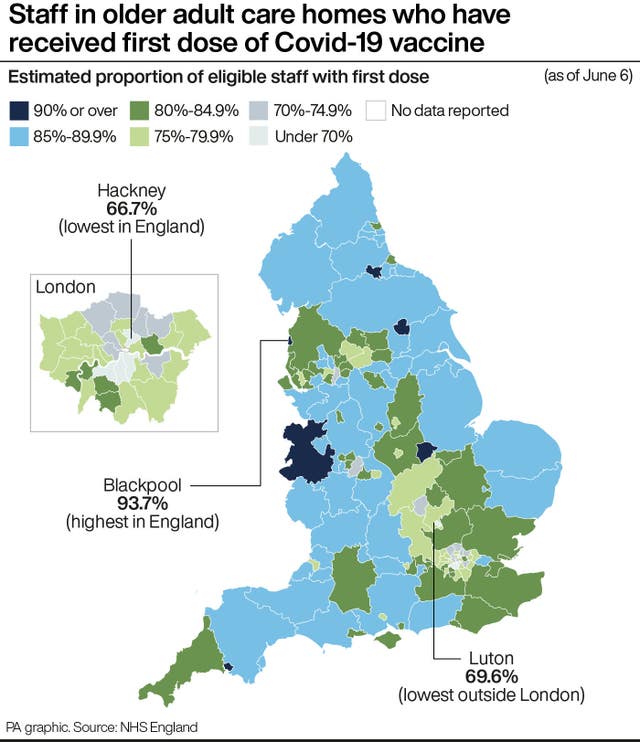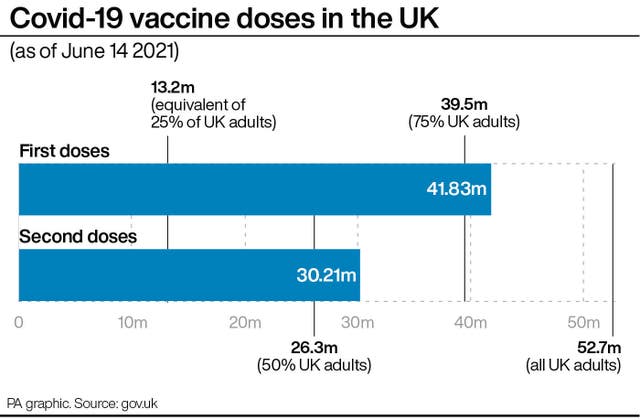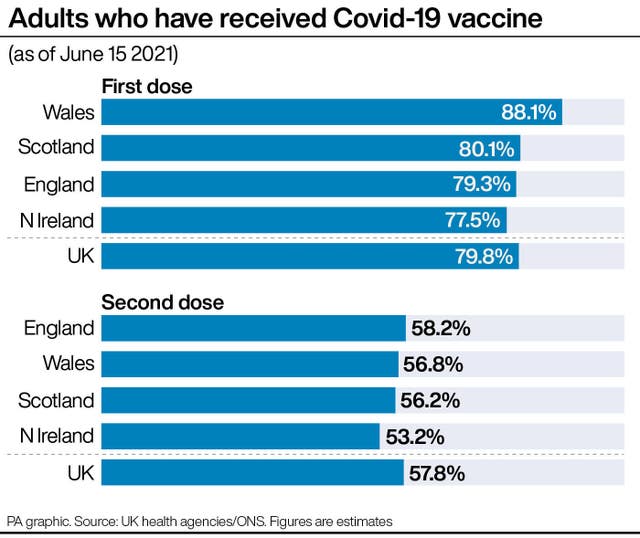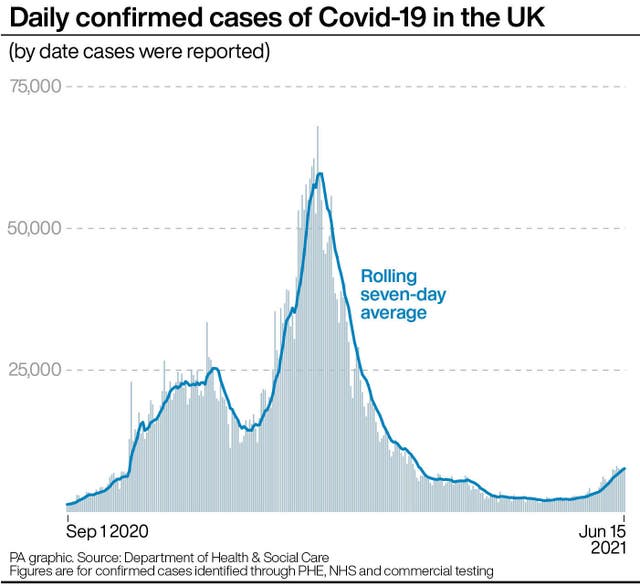Care home sector meeting Government officials over mandatory jabs for staff
One union claims more than a third of carers would consider leaving their jobs if the Covid vaccine is compulsory.

Care leaders are meeting with Government officials over the issue of mandatory coronavirus vaccinations for care home staff, amid concerns it could put people off working in the sector.
Representative bodies have voiced fears that making having the vaccine a requirement will deter those who might have thought of joining the workforce, and see others already in jobs leave as a result.
Following a consultation carried out into using staff vaccination in England to protect the most vulnerable from Covid-19, ministers are understood to be due to announce the move in the coming days.
Health Secretary Matt Hancock is known to be in favour, while England’s chief medical officer, Professor Chris Whitty, has said doctors and care workers have a “professional responsibility” to protect their patients.
Consultation is also expected to begin on whether other health and care workers should also have the jabs.

Providers and representatives from the care sector are attending a virtual meeting with officials from the Department of Health and Social Care on Wednesday to discuss the issue.
The decision, first reported by the Guardian, is controversial, with the GMB union claiming more than a third of carers would consider leaving their jobs if vaccinations become compulsory.
Dr Susan Hopkins, strategic response director for Covid-19 at Public Health England, said there are “pros and cons to any debate on mandatory vaccination”, with one possible downside being that “people may vote with their feet, and not want to have the vaccine, and therefore not work in a care home, and that could lead to staff supply issues in care homes”.
She told the Science and Technology Committee: “I will remain a little bit concerned that we will have shortages of care staff once the mandate has come in, but I’m sure that the vast majority of care workers do want to do the right thing and get vaccinated to protect the elderly under their care.”
Mike Padgham, chairman of the Independent Care Group (ICG) which represents care homes in Yorkshire, said recruitment was “always challenging” before the pandemic and “is becoming more critical now”.
He told the PA news agency: “If this goes ahead and is compulsory then I think it will put people off coming into the service. That’s one problem.
“The second problem is people who are already working in the service who might not want the vaccine. We are so stretched for frontline staff. It sounds easy to redeploy them but it isn’t easy to replace them when you redeploy them. And I think people will be put off.”

While his area of Yorkshire has a relatively high uptake of the jab, some parts of the country, such as London, have far lower levels among care home staff.
NHS figures to June 6 show overall that 84% of staff in older adult care homes in England have had one dose of vaccine, and almost 69% have had both jabs.
But the data shows that in Hackney, east London, for example, just 66.7% of staff in older adult care homes have had their first dose, with only 58.6% of staff in the borough having both doses.
Some care home staff have already signalled their intention to leave their jobs if they are required to have the vaccination, an industry operator has said.
Geoff Butcher, who runs six homes in the Midlands, said he also knows of someone who has now decided not to get the jab “on principle”, and another who walked out of a job interview because of reports it is to be made mandatory.
He told PA that staffing issues are the “biggest concern” for the sector and that the Government move “will add hugely to the problems in recruiting”.
A Department of Health and Social Care spokeswoman said: “Vaccines are our way out of this pandemic and have already saved thousands of lives – with millions of health and care staff vaccinated.
“Our priority is to make sure people in care homes are protected and we launched the consultation to get views on whether and how the Government might take forward a new requirement for adult care home providers, looking after older people, to only deploy staff who have had a Covid-19 vaccination or have an appropriate exemption.”
GMB national officer Rachel Harrison said: “The Government could do a lot to help them (care workers): address their pay, terms and conditions, increasing the rate of and access to contractual sick pay, banning zero hours, and ensuring more mobile NHS vaccination teams so those working night shifts can get the jab.
“Instead, ministers are ploughing ahead with plans to strongarm care workers into taking the vaccine without taking seriously the massive blocks these workers still face in getting jabbed.”
Research published last month by the London School of Hygiene & Tropical Medicine (LSHTM) found black African and mixed black African staff are almost twice as likely to decline a vaccination as white British and white Irish participants.
Reasons included concerns about a lack of research and distrust in the vaccines, healthcare providers, and policymakers.
Some social care staff also described “quite a battle” in getting jabs, saying they received mixed messages about whether they should organise vaccination through their employer or GP.
Unison general secretary Christina McAnea said: “Research shows encouragement achieves better results with the nervous than threats or coercion.

“The Government’s sledgehammer approach now runs the risk that some care staff may simply walk away from an already understaffed, undervalued and underpaid sector.”
Vic Rayner, chief executive of the National Care Forum, said a decision to force care home workers to be deployed elsewhere if they are not vaccinated in 16 weeks would be “really challenging” and it is potentially about people not being able to work in the sector.
She told BBC Breakfast: “That’s really challenging for a sector that’s largely made up of small employers and don’t really have anywhere else for people to go, so we need to be really clear that this is potentially about people no longer being able to work in the sector, and that’s probably one of the primary concerns.”
Director of public health for Gateshead, Alice Wiseman, told Times Radio she is in favour of the move, saying: “This is a really difficult decision because nobody ever wants to take away an individual’s right to have that choice.
“But we do make some vaccines mandatory in other aspects of healthcare. So, for example, we ensure all surgeons have their Hep B vaccination, and it’s really important that we do this where we’re protecting those people who we are caring for.”
Professor Martin Green, chief executive of Care England, said there must be “infrastructure support” to make the Government decision work.
He said: “There must be central guidance, funding and leadership in helping to support adult social care providers in implementing the regulation.”

The UK’s human rights watchdog, the Equality and Human Rights Commission, has concluded it is “reasonable” to legally require care home staff to be vaccinated.
But it did advise that safeguards should be included to minimise the risk of discrimination by including exemptions, such as for staff who cannot be vaccinated for medical reasons.
The Government’s decision could expose employers to unfair dismissal and discrimination claims, said Katie Maguire, an employment partner at Devonshires law firm who represents care home operators.
She said: “When the Government issued this consultation the only exemption stated for not having the jab would be for medical reasons and there was no reference to cultural or religious reasons.
“If this stays the same when vaccines are made mandatory, my concern is that care homes’ employers will be exposed to the legal costs of defending claims brought by employees who are dismissed for not having the jab for discrimination and unfair dismissal.”





